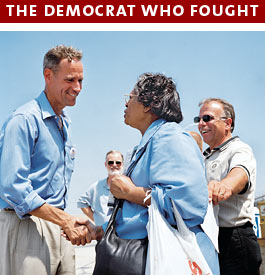
As primary season starts to get under way developments in Ohio made this post possible. The debate within the Democratic Party over the Iraq War is as decisive as the debate that occurred forty years ago with Vietnam.
As the Vietnam War progressed critics of the Johnson Administration’s policy were seen at first as being un-patriotic. As large-scale opposition developed in the later half of the 1960’s, especially after 1968 the debate within the Democratic Party and between Democratic politicians crystallized. A similar event of liner proportions is occurring. After supporting the President and invasion of Iraq due to fear of being called unpatriotic, the Democratic opposition is still trying to play both sides of the argument: opposition to the war and having a plan to conduct the war. While Democrats entangle themselves in debate the Republicans have used this perceived indecision to their collective electoral advantage. If Democrats want to reverse this trend having recent veterans from the War run for office is one of their best options.
Committed veterans who know the realities on the ground and are uniquely insulated from the attack on their patriotism; these are people the Democrat’s need to have in the races. One such Democrat is Paul Hackett. The tough-talking Iraq combat veteran turned a special-election fight in Ohio’s Second District into a political sleeper hit back in 2004. On election night, Hackett pulled 48 percent of the vote in a district where John Kerry got a mere 36 percent. Soon afterward Hackett met several times with Senate Majority Leader Harry Reid and Sen. Chuck Schumer, chair of the Democratic Senatorial Campaign Committee (DSCC), both of whom encouraged him to run for the seat of Ohio’s senior senator, Republican Mike DeWine, in 2006. Hackett agreed after being told by Ohio Congressman Sherrod Brown that he wasn’t planning to run. This spring, Sherrod Brown called informing Hackett he’d changed his mind: he was running after all. Then Schumer called, “Schumer didn’t tell me anything definitive,” he says in a Mother Jones article. “But I’m not a dumb ass, and I know what he wanted me to do.” Hackett says of the Party, “The Democratic Party is like an addict. They’re addicted to failure. I want to help the party. The question is how do you help someone that doesn’t want help?”
The most difficult decision to understand is why support for Hackett has been retracted. It should not be due to his rhetoric, Howard Dean, one-time Democratic presidential hopeful burst into the national spotlight with very similar language and, though, he did win the party’s nomination he is the national chairman. It should not be over the issue of electability. Senior Democrat officials make this explanation irrational by the support, indeed, the request that Hackett run in the first place. The only explanation left is one that is unfortunate, but most likely true. Congressman Brown, after deciding against a Senate run, chose to run and due to prior Congressional experience mixed with internal party politics and a large war chest to spend on a primary, Hackett was forced to step aside for the Party insider.
In side-lining a potential candidate the Democrat’s show that as they are ineffectual in being the honorable Opposition to the Republicans they are ineffectual in choosing candidates that can articulate alternative ideas, strategize and win the hearts of the electorate. An electorate of which, fifty-six percent, in a recent Gallop poll, voiced dissatisfaction with the handling of the war in Iraq. The question is whether or not Brown’s decision was right. Brown says he wouldn’t be giving up a safe congressional seat unless he knew he could beat DeWine, Hackett counters, “If Democrats want to start winning races, they might need a dose of boot-camp discipline: “How come this doesn’t happen in the Republican Party? It’s because they sit down guys like Sherrod and put him in a corner and make him wear the dunce cap.” The question is do Democrats want to win?As long as the Opposition is self-muted, the Republicans will continue the policies that are largely seen as ineffective but are accepted because there is no alternative.

No comments:
Post a Comment